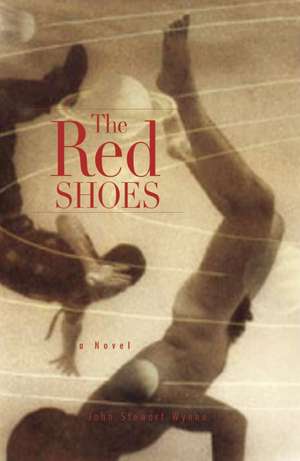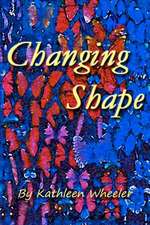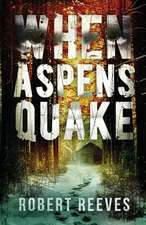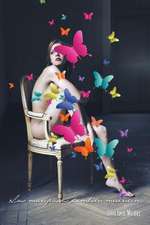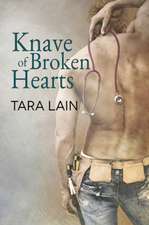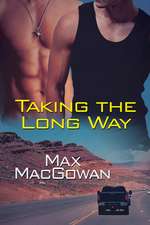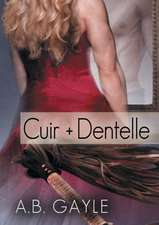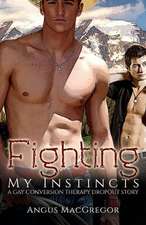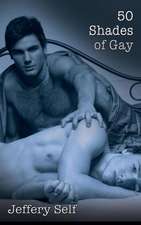The Red Shoes
Autor John Wynneen Limba Engleză Paperback – 18 iun 2013
John Stewart Wynne's The Red Shoes is a contemporary gay version of the classic Hans Christian Andersen fairy tale set in Manhattan. The narrator, John Laith, lives across the street from the Episcopal Seminary in Chelsea. Within its hushed chapel and welcoming gardens he finds solace, mourning the untimely death of his partner Frank and trying to recover from that loss. An active participant in a Twelve Step grief recovery group, he has a loving, supportive network of friends. Yet he feels something is missing, an ability to put his sorrow aside and once again feel the full force of life, its promise of excitement and abandon.
Strangely enough, that opportunity presents itself in the form of a present given to him—a pair of shiny red shoes—by a handsome eighteen-year-old modern dancer named Jared who arrived in the city
nine months earlier fresh from the country. But Jared failed to make his mark in the city as an artist—the red shoes didn’t help him win auditions but spun him out of control into a series of casual affairs culminating in a sexual assault on Gay Pride Day. Narrator John Laith helps Jared recover after that assault and gets him on a bus back home. Jared has nothing to offer Laith by way of thanks except his red shoes.
Laith now possesses the sparkling red shoes. Or perhaps they possess him—propelling him on a perilous journey through both the affluent and seedy sides of a vividly brought to life Manhattan at the turn of the millennium.
An innocent in a sinister underworld, Laith tries to survive his newfound ties to unpredictable and chillingly unforgettable characters. There’s Crewe James, a multi-millionaire living with his imperious wife and daughter in a Gothic castle-like Central Park West penthouse, who has unsavory secrets and a possibly dark agenda for Laith ... Silvio, a taciturn Brooklyn cop with a propensity for rough sex ... Baily, a drug-fueled bouncer in a Euro-trash Chelsea nightclub owned by his boss Maxo, who works the front bar yet oversees some business in the backroom as well ... And Maxo’s absinthe-addicted, ethereally beautiful “lady,” Patrizia, a kindred spirit to John Laith who tries to become a protective fairy godmother to him.
Laith inexplicably cannot escape his fascination with exploring the dark side. Is it because of the terrible magical powers of those red shoes given to him by the young dancer? Or is it because of some hidden desire within himself?
As Laith collides with these mysterious characters and immerses himself in their obsessive lives, he finds he still can’t quite let go of his lost love. His poignant preoccupations with loss, danger and safety continue to loom in and out of focus in the surreal fog of his escalating drug use and increasing periods of sexual oblivion. Eventually Laith must confront his own downward spiral. A riveting battle between the sacred and the profane is at war inside him—and in the end there comes a shocking moment of realization where he must finally choose between them.
Strangely enough, that opportunity presents itself in the form of a present given to him—a pair of shiny red shoes—by a handsome eighteen-year-old modern dancer named Jared who arrived in the city
nine months earlier fresh from the country. But Jared failed to make his mark in the city as an artist—the red shoes didn’t help him win auditions but spun him out of control into a series of casual affairs culminating in a sexual assault on Gay Pride Day. Narrator John Laith helps Jared recover after that assault and gets him on a bus back home. Jared has nothing to offer Laith by way of thanks except his red shoes.
Laith now possesses the sparkling red shoes. Or perhaps they possess him—propelling him on a perilous journey through both the affluent and seedy sides of a vividly brought to life Manhattan at the turn of the millennium.
An innocent in a sinister underworld, Laith tries to survive his newfound ties to unpredictable and chillingly unforgettable characters. There’s Crewe James, a multi-millionaire living with his imperious wife and daughter in a Gothic castle-like Central Park West penthouse, who has unsavory secrets and a possibly dark agenda for Laith ... Silvio, a taciturn Brooklyn cop with a propensity for rough sex ... Baily, a drug-fueled bouncer in a Euro-trash Chelsea nightclub owned by his boss Maxo, who works the front bar yet oversees some business in the backroom as well ... And Maxo’s absinthe-addicted, ethereally beautiful “lady,” Patrizia, a kindred spirit to John Laith who tries to become a protective fairy godmother to him.
Laith inexplicably cannot escape his fascination with exploring the dark side. Is it because of the terrible magical powers of those red shoes given to him by the young dancer? Or is it because of some hidden desire within himself?
As Laith collides with these mysterious characters and immerses himself in their obsessive lives, he finds he still can’t quite let go of his lost love. His poignant preoccupations with loss, danger and safety continue to loom in and out of focus in the surreal fog of his escalating drug use and increasing periods of sexual oblivion. Eventually Laith must confront his own downward spiral. A riveting battle between the sacred and the profane is at war inside him—and in the end there comes a shocking moment of realization where he must finally choose between them.
Preț: 154.58 lei
Nou
Puncte Express: 232
Preț estimativ în valută:
29.58€ • 30.82$ • 24.49£
29.58€ • 30.82$ • 24.49£
Carte tipărită la comandă
Livrare economică 31 martie-05 aprilie
Preluare comenzi: 021 569.72.76
Specificații
ISBN-13: 9781936833429
ISBN-10: 1936833425
Pagini: 444
Dimensiuni: 133 x 203 x 25 mm
Greutate: 0.5 kg
Editura: Riverdale Avenue Books
ISBN-10: 1936833425
Pagini: 444
Dimensiuni: 133 x 203 x 25 mm
Greutate: 0.5 kg
Editura: Riverdale Avenue Books
Notă biografică
John Stewart Wynne is the author of novels, short stories and poetry. His writing often depicts characters in extremis, outsiders adrift in a conformist landscape, in plots that successfully juxtapose the surreal and naturalistic. He has been hailed as the heir apparent to the tradition of “outsider art” exemplified by Tennessee Williams, Carson McCullers and Truman Capote. Wynne’s writing has been praised for its audacious originality, its beautiful imagery, the astute asides and wry observations of his characters, and his highly charged but often darkly comic mise-en-scènes—all of which are present in his new novel The Red Shoes.
His short story collection The Other World (City Lights) was hailed as “one of the best books of the decade” by The James White Review. Peopled with circus performers, sociopaths, cross-dressing teenagers and God-fearing families, these stories have a hallucinatory edge, making the everyday seem like another world. Details Magazine wrote, “Wynne’s prose is chiseled and precise. And in pages that tremble with beauty, Wynne gracefully reveals the darker side of human possibilities.” Booklist called it “startling, outrageous, frightening and sometimes even funny.” National Book Award-winner Paul Monette wrote, “With so much sentimental fiction coming out, Wynne’s stories are like a plunge in cold water with a near-Brechtian intensity of focus and an infallible ear for dialogue.” Lambda Award-winner Rebecca Brown called it “an incredibly powerful book.”
The author lives in New York, NY.
His short story collection The Other World (City Lights) was hailed as “one of the best books of the decade” by The James White Review. Peopled with circus performers, sociopaths, cross-dressing teenagers and God-fearing families, these stories have a hallucinatory edge, making the everyday seem like another world. Details Magazine wrote, “Wynne’s prose is chiseled and precise. And in pages that tremble with beauty, Wynne gracefully reveals the darker side of human possibilities.” Booklist called it “startling, outrageous, frightening and sometimes even funny.” National Book Award-winner Paul Monette wrote, “With so much sentimental fiction coming out, Wynne’s stories are like a plunge in cold water with a near-Brechtian intensity of focus and an infallible ear for dialogue.” Lambda Award-winner Rebecca Brown called it “an incredibly powerful book.”
The author lives in New York, NY.
Extras
PROLOGUE
Every day has its misgivings.
Man lives by faith, they say, but personally I think man wants to render faith unnecessary. If I slipped off a tightrope I’d for damn sure rather know there’s a safety net down there than not. One that I could clearly see. But lately there seems to be a dearth of nets — maybe there’s some manufacturing
problem — because there aren’t a hell of a lot of them around. Sooner or later I have to return to that thing man lives by.
The Episcopal Seminary stands in Chelsea as a bit of Old England, stern yet spiritual, judgmental yet welcoming, very green in the summer and soft and I like it best then. I’ve lived across the street from this astonishing edifice for the last three years. In fact the red bricks of the Seminary wall and the rising
chapel, sturdy as the tops of the two plane trees that touch it, are framed dead center by my French windows, thrown open even through the autumn. Quite a view, my friends have told me, describing it most often as “inspiring.” But today...well, I’ve just walked back from the Seminary and, gazing out that
window, I feel as distant as the radium blue sky. Let me tell you... It was hot on the garden path.
Several Seminary students passed me, smiling carefully, their footsteps silent, clinging to areas of shade like discreet ghosts. Everywhere flower beds had burst, spilled over onto the concrete walk. The wiry stems of the coneflowers were already bearing yellow daisies and the deep rose flush on the outer petals of the saucer magnolias amazed me.
Overhead a blue jay screamed. And white clouds, thick and heavy, blew over the garrets of the neighborhood brownstones. But the sun was the main thing. Maybe because I’ve been through what I would call hell, the sun, as it bore right through my clothes, regenerated me, like a jolt from God.
I sat down on the gray stone bench facing the Chapel of the Good Shepherd. Above its entrance was a bas-relief of Jesus tending the lambs with his crooked staff and on the steps below these words were engraved: Blessed are they that enter in through the gates into the City. Two full-paned glass doors led into the chapel. Through this glass, reflecting leaf-filled trees, I could just make out the recessed altar, dimly, and even shapes on the stained-glass windows, fitting together like pieces of a mystical puzzle that meant only what you wanted it to. And in that puzzle I saw his face as I always saw it. Frank’s face, calmly regarding the person opposite him — me — and wanting somehow, in an amused and impossible way, to speak.
I listened to the leaves, in ample bunches, moving back and forth. It took me awhile to notice the man on the stone bench adjacent to mine, engrossed in his Wall Street Journal, oblivious to the world at large. His thick hair was dark but had a couple of strands running through it that had already turned white though he couldn’t have been over forty. He was tall and angular and the casual sports clothes he wore seemed at odds with the air of privilege, even arrogance, he otherwise projected. Somebody else must have picked out those clothes for him.
It’s been said that by simply watching a man walk into a room and sit down in a chair you know all there is to know about him. There’s some truth to that. Just by observing this man I could see he was full of a tense, repressed energy. Once he looked up at me, hastily, through heavy-rimmed glasses, then
returned to his Journal like a driver intently perusing a road map, determined to find the quickest route. To money, I supposed. I could see he was eyeballing stock quotations. Weird, the two of us coming to the Seminary for such different purposes.
Mine was to pray.
Once inside the chapel, I knelt on one of the pews nearest the altar, my jeans sticking to the faded brown leather which had heated up, even through stained glass. I was like a fly in a honey pot — feeling good and sticky — and just where I wanted to be.
This communication with God was always the highpoint of my week...God, take my burdens from me. Give my spirit a jump start back into the stratosphere where it belongs instead of under the soles of my shoes. Release me from the terrible mysteries of this world that are unsolvable — like Frank’s death. And protect Frank, whose body I can see now in a circle of heat lightning, but whose soul I couldn’t begin to objectify though I know it is roaming somewhere in the life beyond. Nearer you.
When you lose the person you love most in life you are changed forever. You stand on a precipice estranged from yourself. Half of you lies dashed on the rocks below while the other half doesn’t even know the cliff has an unexpected drop-off. You have no idea who you have become. The new face in the mirror provides no clues. But I’ll tell you this much. A man who can’t find his splinters
always hurts.
My communications always ended the same way, with me hearing sounds, muffled, incredibly far away, birdsong, the splash of water, laughter without care, then abrupt silence.
I left the chapel, moving past the man still sitting there reading his paper. I don’t know why I looked at him but when I did he lifted the paper off his lap to show me his hard fat dick sticking straight up out of his fly. You know the rush you get when you’re shocked unexpectedly? Everything explodes in a nanosecond. You jerk to a halt, your heart beats fast, your ears feel hot, and your lips part, but before you can speak they close like a crocus — prematurely. All those explosions happened in me then settled like so much dust in the pit of my stomach.
First making sure no one was watching, as if I were somehow responsible for his behavior, I searched his eyes for some explanation. But they were vacant, green and glassy, though prominent behind his lenses, fixed directly on me as he masturbated his big engorged dick. Challenging me. But to do what?
I heard laughter from behind the chapel, probably coming from some of the Seminary students. As their laughter became louder, I realized they must be heading in our direction. So did he — but he made no move to cover himself.
When I looked into his eyes again, they had changed. The vacant stare had been replaced by an unmistakable malevolence. I abruptly turned away and strode out of the Seminary garden, hands
thrust deep in my pockets, thinking fuck you and trying hard to concentrate on the hundreds of flowers in my way, but unable to find the equilibrium to do it.
So you see, I’m standing here at my window, gazing at the chapel, but seeing it with new eyes, with the dullness of someone who’s been raped. He’d waited. A stalker. When I was at my most vulnerable, lost in prayer, he’d struck.
Of course it wasn’t about sex, everybody was a little savvier about that nowadays. It was about aggression and behind this bold act of exhibitionism was incredible anger, so close behind that it was transparent. This was one troubled motherfucker who needed to punish and to hurt. The question was why should I be so shaken up? It had nothing to do with me. I was probably his mother or his
father. I’d just happened to blissfully stumble into the world he was getting back at...Was he still there now, dick stuffed back into his pants, reading innocently, or had he moved to some new hunting ground? Hell, I wanted to forget the whole thing, get it out of my mind and enjoy what promised to be an unusually balmy summer evening. In fact I lit some candles in anticipation, though evening was far off. A low breeze coming up off the Hudson made the room comfortable and fresh. I kept seeing that bloated dick in my mind. I wished I didn’t but the image was a little too strong.
By dusk, however, it was humid and still, the promise of that mild evening having suddenly dissipated along with the fleeting afternoon breeze. Now all that moved were the gnats buzzing up and down the remnants of the candles, burned nearly to the bottom of their wicks. The sky had turned a dull gray,
tinged now and then with thin streaks of yellow. I turned on the air conditioner mounted in the bedroom window. It was strong enough to cool down the whole apartment.
During the next few hours I skimmed through a couple of newspapers, half-heartedly tried to finish a middle chapter of an already predictable mystery, paid some bills online, made a couple of phone calls to members of my bereavement group, mechanically jerked-off, separated clothes into piles for an
eventual trip to the laundry and felt generally depressed. I couldn’t put my finger on exactly why, but I did wonder about it.
Maybe it was because of the lack of a love life. It had been a long time, a few years since I’d had sex, an encounter that began by someone picking me up on the street opposite Clement Clarke Moore Park. I couldn’t remember his face, name or what his apartment looked like, but I did remember the length of
time I spent with him — a half an hour. This passage of time without sex had occurred in me — a man of only thirty-five with an active sex drive and imagination. But sex was one thing and love another, at least in my mind — and it had been a long time too, four years, since Frank had died, and I hadn’t loved
anyone since him. Sex. Love. The lack of both was like two deprivations from two deep and timeless wells.
Those who meant well were always encouraging me to find both, preferably in one package, right? But that didn’t seem an easy task. I couldn’t think of any immediate prospects. I knew a number of darkened public rooms in Chelsea, but they weren’t bars or clubs, they were church basements — the
dark, musty spaces, sometimes lit by a single bulb or fluorescent tube, where my fellow journeyers and I met in bereavement, not passion. And that was fine for now. I didn’t want to go to the bars or clubs or cruise Internet chat rooms, casual pick-ups weren’t on my mind, and as for a new love, I was too guilt- ridden to consider it, not when the old one wouldn’t die. But friends persisted — they told me I was handsome, desirable and emotionally available — and I believed them. But if this lack was the cause of my depression, I was too ambivalent to find out for sure. I didn’t want to hunt the unknown.
It was late. I turned off the air conditioner and opened my bedroom window. It had cooled down outside and there was even a breeze that had come up. As I stood at the window, I caught sight of some of my neighbors in the back windows of their brownstones that butted up against our common
garden. I have to say, Manhattan isn’t exactly a fertile ground for shrinking violets — it’s much too small and crowded. At one point or another everybody says to hell with it and lets their hair down on the lit stages of their own homes.
A voyeur’s paradise. Or is it? After all, the night is a great aider and abettor... a camouflager...my neighbors across the garden, giving into their nighttime dramas with silent theatrical gestures, resemble nothing more than tricksters, con artists and charlatans, insubstantial figures ready to disappear in a puff of smoke as the blinds are drawn. Frustrating anyone who wants to see a piece of their souls. The only real thing in this landscape are the sounds of boisterous, traded laughter, or fights breaking out, blocks away, or the tinny honking of horns, or occasionally the whistle of the Jersey train, as lonely and as full of portent as any midnight train in the rural South.
When I finally fell asleep, Frank came to me and comforted me, just like always. I opened my wings like a butterfly when he did and moved them gently.
Then we both flew away.
What had saved me, not surprisingly, was my involvement with others who had suffered, I won’t say a similar loss, I’m too arrogant for that, but a loss nonetheless and usually a deep and perplexing one. We gave each other much needed counsel and became, for each other, reliable leaning posts. Always
supporting what seemed nearly insupportable so that the very surreal unlikeliness of living on increased, albeit at a snail’s pace. As time passed in this way, sources of light did return to my life in varying degrees, sometimes faintly, like a night-light barely blinking, sometimes surreptitiously, like a small rectangular white band seeping under a door, and sometimes even spectacularly, like a starburst ending a nightmare that had stalled in unremitting blackness.
Times shared with members of my bereavement group kind of shocked me into a renewed vigor, dissipating my haze of self-pity. Together we white- knuckled the bar of the roller coaster — our only means of transportation through the process of grieving. Sometimes we even dared let go of that bar,
lifted our hands up over our heads, screamed, whooped, cursed and had lots of collective fun.
It was only when I got back home and shut the door that I understood so much had been taken from me when Frank died and that I’d much rather have been engaged in all those activities not with these new friends but with Frank instead. That’s my definition of love — when you want unquestionably the
pleasure of a specific person’s company — and no one else will do.
The superintendent of my building has a sixteen-year-old son who’s a goofball named Tony. Most days after school he and his buddies can be found hanging out in our lobby. They’re a loud, hyper, obnoxious bunch, either making lewd or derogatory comments about the tenants as they come and go or placing random calls on their cell phones and belching or farting when somebody answers.
But when I walked into the lobby this afternoon, Tony was alone, lackadaisically sweeping up the floor with a dog-eared broom, bravado gone, obviously embarrassed to be helping out his dad with this menial task.
As I pressed the elevator button I was surprised when he sidled up and started sweeping right next to me, staring dully at the floor. I’ve usually caught him eyeing me as if I were some very rare thing who ended up on his terra-firma like an exotic pollen.
Imagine my surprise when he said, “Hey.”
I looked at him. He leaned on his broom with a confused expression on his face, brows twisted in a thinker’s frown.
“How’s it going?” I asked.
“You used to have a boyfriend who died, right?”
I was taken aback by his question but found myself nodding yes. But when he glibly asked “AIDS?” I was about to tell him to mind his own fucking business when the word fell out of me like a key accidentally falls from a lock, “Alcoholism.” I felt like I wanted to stab him in the gut and watch him bleed to death, that’s how raw I was, then when he raised his eyebrows and asked, “But he was young, right?” as if he just didn’t get it, I answered, “On this plane, yes,” got into the elevator and quickly pressed the CLOSE DOOR button.
Frank had died before I even moved here. But word always travels. I guess somebody in the building who knew had shared the information with the super who had shared it with his son. Whatever. It wasn’t really a secret anyway.
Tony is a dumb, insensitive asshole, that’s for sure, but he is also curious. He doesn’t live in the subliminal discomfort that I do. To him questions have answers. God, if I only had a life I was happy with. Maybe I am an exotic pollen. In the scheme of things, that would not only be acceptable, but intriguing.
Every day has its misgivings.
Man lives by faith, they say, but personally I think man wants to render faith unnecessary. If I slipped off a tightrope I’d for damn sure rather know there’s a safety net down there than not. One that I could clearly see. But lately there seems to be a dearth of nets — maybe there’s some manufacturing
problem — because there aren’t a hell of a lot of them around. Sooner or later I have to return to that thing man lives by.
The Episcopal Seminary stands in Chelsea as a bit of Old England, stern yet spiritual, judgmental yet welcoming, very green in the summer and soft and I like it best then. I’ve lived across the street from this astonishing edifice for the last three years. In fact the red bricks of the Seminary wall and the rising
chapel, sturdy as the tops of the two plane trees that touch it, are framed dead center by my French windows, thrown open even through the autumn. Quite a view, my friends have told me, describing it most often as “inspiring.” But today...well, I’ve just walked back from the Seminary and, gazing out that
window, I feel as distant as the radium blue sky. Let me tell you... It was hot on the garden path.
Several Seminary students passed me, smiling carefully, their footsteps silent, clinging to areas of shade like discreet ghosts. Everywhere flower beds had burst, spilled over onto the concrete walk. The wiry stems of the coneflowers were already bearing yellow daisies and the deep rose flush on the outer petals of the saucer magnolias amazed me.
Overhead a blue jay screamed. And white clouds, thick and heavy, blew over the garrets of the neighborhood brownstones. But the sun was the main thing. Maybe because I’ve been through what I would call hell, the sun, as it bore right through my clothes, regenerated me, like a jolt from God.
I sat down on the gray stone bench facing the Chapel of the Good Shepherd. Above its entrance was a bas-relief of Jesus tending the lambs with his crooked staff and on the steps below these words were engraved: Blessed are they that enter in through the gates into the City. Two full-paned glass doors led into the chapel. Through this glass, reflecting leaf-filled trees, I could just make out the recessed altar, dimly, and even shapes on the stained-glass windows, fitting together like pieces of a mystical puzzle that meant only what you wanted it to. And in that puzzle I saw his face as I always saw it. Frank’s face, calmly regarding the person opposite him — me — and wanting somehow, in an amused and impossible way, to speak.
I listened to the leaves, in ample bunches, moving back and forth. It took me awhile to notice the man on the stone bench adjacent to mine, engrossed in his Wall Street Journal, oblivious to the world at large. His thick hair was dark but had a couple of strands running through it that had already turned white though he couldn’t have been over forty. He was tall and angular and the casual sports clothes he wore seemed at odds with the air of privilege, even arrogance, he otherwise projected. Somebody else must have picked out those clothes for him.
It’s been said that by simply watching a man walk into a room and sit down in a chair you know all there is to know about him. There’s some truth to that. Just by observing this man I could see he was full of a tense, repressed energy. Once he looked up at me, hastily, through heavy-rimmed glasses, then
returned to his Journal like a driver intently perusing a road map, determined to find the quickest route. To money, I supposed. I could see he was eyeballing stock quotations. Weird, the two of us coming to the Seminary for such different purposes.
Mine was to pray.
Once inside the chapel, I knelt on one of the pews nearest the altar, my jeans sticking to the faded brown leather which had heated up, even through stained glass. I was like a fly in a honey pot — feeling good and sticky — and just where I wanted to be.
This communication with God was always the highpoint of my week...God, take my burdens from me. Give my spirit a jump start back into the stratosphere where it belongs instead of under the soles of my shoes. Release me from the terrible mysteries of this world that are unsolvable — like Frank’s death. And protect Frank, whose body I can see now in a circle of heat lightning, but whose soul I couldn’t begin to objectify though I know it is roaming somewhere in the life beyond. Nearer you.
When you lose the person you love most in life you are changed forever. You stand on a precipice estranged from yourself. Half of you lies dashed on the rocks below while the other half doesn’t even know the cliff has an unexpected drop-off. You have no idea who you have become. The new face in the mirror provides no clues. But I’ll tell you this much. A man who can’t find his splinters
always hurts.
My communications always ended the same way, with me hearing sounds, muffled, incredibly far away, birdsong, the splash of water, laughter without care, then abrupt silence.
I left the chapel, moving past the man still sitting there reading his paper. I don’t know why I looked at him but when I did he lifted the paper off his lap to show me his hard fat dick sticking straight up out of his fly. You know the rush you get when you’re shocked unexpectedly? Everything explodes in a nanosecond. You jerk to a halt, your heart beats fast, your ears feel hot, and your lips part, but before you can speak they close like a crocus — prematurely. All those explosions happened in me then settled like so much dust in the pit of my stomach.
First making sure no one was watching, as if I were somehow responsible for his behavior, I searched his eyes for some explanation. But they were vacant, green and glassy, though prominent behind his lenses, fixed directly on me as he masturbated his big engorged dick. Challenging me. But to do what?
I heard laughter from behind the chapel, probably coming from some of the Seminary students. As their laughter became louder, I realized they must be heading in our direction. So did he — but he made no move to cover himself.
When I looked into his eyes again, they had changed. The vacant stare had been replaced by an unmistakable malevolence. I abruptly turned away and strode out of the Seminary garden, hands
thrust deep in my pockets, thinking fuck you and trying hard to concentrate on the hundreds of flowers in my way, but unable to find the equilibrium to do it.
So you see, I’m standing here at my window, gazing at the chapel, but seeing it with new eyes, with the dullness of someone who’s been raped. He’d waited. A stalker. When I was at my most vulnerable, lost in prayer, he’d struck.
Of course it wasn’t about sex, everybody was a little savvier about that nowadays. It was about aggression and behind this bold act of exhibitionism was incredible anger, so close behind that it was transparent. This was one troubled motherfucker who needed to punish and to hurt. The question was why should I be so shaken up? It had nothing to do with me. I was probably his mother or his
father. I’d just happened to blissfully stumble into the world he was getting back at...Was he still there now, dick stuffed back into his pants, reading innocently, or had he moved to some new hunting ground? Hell, I wanted to forget the whole thing, get it out of my mind and enjoy what promised to be an unusually balmy summer evening. In fact I lit some candles in anticipation, though evening was far off. A low breeze coming up off the Hudson made the room comfortable and fresh. I kept seeing that bloated dick in my mind. I wished I didn’t but the image was a little too strong.
By dusk, however, it was humid and still, the promise of that mild evening having suddenly dissipated along with the fleeting afternoon breeze. Now all that moved were the gnats buzzing up and down the remnants of the candles, burned nearly to the bottom of their wicks. The sky had turned a dull gray,
tinged now and then with thin streaks of yellow. I turned on the air conditioner mounted in the bedroom window. It was strong enough to cool down the whole apartment.
During the next few hours I skimmed through a couple of newspapers, half-heartedly tried to finish a middle chapter of an already predictable mystery, paid some bills online, made a couple of phone calls to members of my bereavement group, mechanically jerked-off, separated clothes into piles for an
eventual trip to the laundry and felt generally depressed. I couldn’t put my finger on exactly why, but I did wonder about it.
Maybe it was because of the lack of a love life. It had been a long time, a few years since I’d had sex, an encounter that began by someone picking me up on the street opposite Clement Clarke Moore Park. I couldn’t remember his face, name or what his apartment looked like, but I did remember the length of
time I spent with him — a half an hour. This passage of time without sex had occurred in me — a man of only thirty-five with an active sex drive and imagination. But sex was one thing and love another, at least in my mind — and it had been a long time too, four years, since Frank had died, and I hadn’t loved
anyone since him. Sex. Love. The lack of both was like two deprivations from two deep and timeless wells.
Those who meant well were always encouraging me to find both, preferably in one package, right? But that didn’t seem an easy task. I couldn’t think of any immediate prospects. I knew a number of darkened public rooms in Chelsea, but they weren’t bars or clubs, they were church basements — the
dark, musty spaces, sometimes lit by a single bulb or fluorescent tube, where my fellow journeyers and I met in bereavement, not passion. And that was fine for now. I didn’t want to go to the bars or clubs or cruise Internet chat rooms, casual pick-ups weren’t on my mind, and as for a new love, I was too guilt- ridden to consider it, not when the old one wouldn’t die. But friends persisted — they told me I was handsome, desirable and emotionally available — and I believed them. But if this lack was the cause of my depression, I was too ambivalent to find out for sure. I didn’t want to hunt the unknown.
It was late. I turned off the air conditioner and opened my bedroom window. It had cooled down outside and there was even a breeze that had come up. As I stood at the window, I caught sight of some of my neighbors in the back windows of their brownstones that butted up against our common
garden. I have to say, Manhattan isn’t exactly a fertile ground for shrinking violets — it’s much too small and crowded. At one point or another everybody says to hell with it and lets their hair down on the lit stages of their own homes.
A voyeur’s paradise. Or is it? After all, the night is a great aider and abettor... a camouflager...my neighbors across the garden, giving into their nighttime dramas with silent theatrical gestures, resemble nothing more than tricksters, con artists and charlatans, insubstantial figures ready to disappear in a puff of smoke as the blinds are drawn. Frustrating anyone who wants to see a piece of their souls. The only real thing in this landscape are the sounds of boisterous, traded laughter, or fights breaking out, blocks away, or the tinny honking of horns, or occasionally the whistle of the Jersey train, as lonely and as full of portent as any midnight train in the rural South.
When I finally fell asleep, Frank came to me and comforted me, just like always. I opened my wings like a butterfly when he did and moved them gently.
Then we both flew away.
What had saved me, not surprisingly, was my involvement with others who had suffered, I won’t say a similar loss, I’m too arrogant for that, but a loss nonetheless and usually a deep and perplexing one. We gave each other much needed counsel and became, for each other, reliable leaning posts. Always
supporting what seemed nearly insupportable so that the very surreal unlikeliness of living on increased, albeit at a snail’s pace. As time passed in this way, sources of light did return to my life in varying degrees, sometimes faintly, like a night-light barely blinking, sometimes surreptitiously, like a small rectangular white band seeping under a door, and sometimes even spectacularly, like a starburst ending a nightmare that had stalled in unremitting blackness.
Times shared with members of my bereavement group kind of shocked me into a renewed vigor, dissipating my haze of self-pity. Together we white- knuckled the bar of the roller coaster — our only means of transportation through the process of grieving. Sometimes we even dared let go of that bar,
lifted our hands up over our heads, screamed, whooped, cursed and had lots of collective fun.
It was only when I got back home and shut the door that I understood so much had been taken from me when Frank died and that I’d much rather have been engaged in all those activities not with these new friends but with Frank instead. That’s my definition of love — when you want unquestionably the
pleasure of a specific person’s company — and no one else will do.
The superintendent of my building has a sixteen-year-old son who’s a goofball named Tony. Most days after school he and his buddies can be found hanging out in our lobby. They’re a loud, hyper, obnoxious bunch, either making lewd or derogatory comments about the tenants as they come and go or placing random calls on their cell phones and belching or farting when somebody answers.
But when I walked into the lobby this afternoon, Tony was alone, lackadaisically sweeping up the floor with a dog-eared broom, bravado gone, obviously embarrassed to be helping out his dad with this menial task.
As I pressed the elevator button I was surprised when he sidled up and started sweeping right next to me, staring dully at the floor. I’ve usually caught him eyeing me as if I were some very rare thing who ended up on his terra-firma like an exotic pollen.
Imagine my surprise when he said, “Hey.”
I looked at him. He leaned on his broom with a confused expression on his face, brows twisted in a thinker’s frown.
“How’s it going?” I asked.
“You used to have a boyfriend who died, right?”
I was taken aback by his question but found myself nodding yes. But when he glibly asked “AIDS?” I was about to tell him to mind his own fucking business when the word fell out of me like a key accidentally falls from a lock, “Alcoholism.” I felt like I wanted to stab him in the gut and watch him bleed to death, that’s how raw I was, then when he raised his eyebrows and asked, “But he was young, right?” as if he just didn’t get it, I answered, “On this plane, yes,” got into the elevator and quickly pressed the CLOSE DOOR button.
Frank had died before I even moved here. But word always travels. I guess somebody in the building who knew had shared the information with the super who had shared it with his son. Whatever. It wasn’t really a secret anyway.
Tony is a dumb, insensitive asshole, that’s for sure, but he is also curious. He doesn’t live in the subliminal discomfort that I do. To him questions have answers. God, if I only had a life I was happy with. Maybe I am an exotic pollen. In the scheme of things, that would not only be acceptable, but intriguing.
